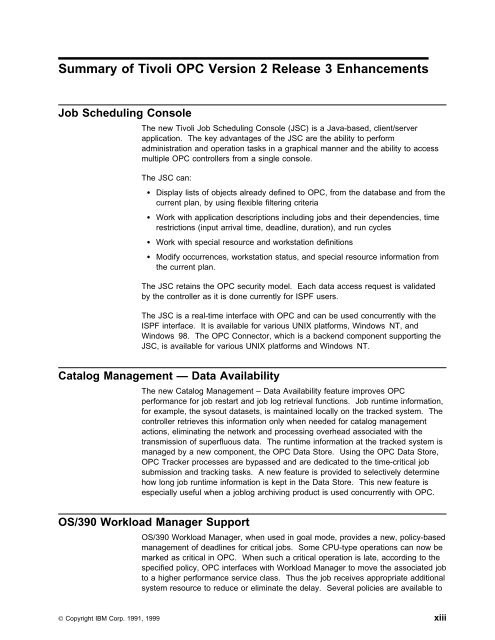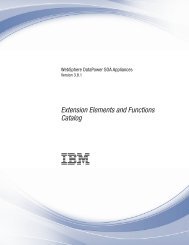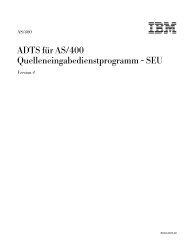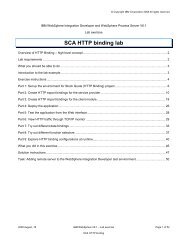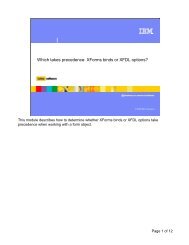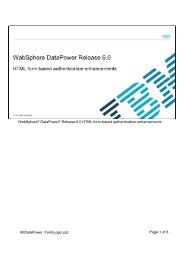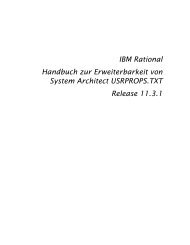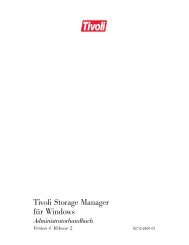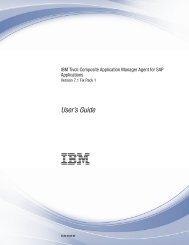- Page 1: Tivoli Operations Planning and Cont
- Page 4 and 5: Note Before using this information
- Page 6 and 7: iv Tivoli OPC Messages and Codes Ch
- Page 8 and 9: vi Tivoli OPC Messages and Codes
- Page 10 and 11: Trademarks The following terms are
- Page 12 and 13: Tivoli OPC Publications This book i
- Page 16 and 17: decide when a job is late, consider
- Page 18 and 19: New and Changed Initialization Stat
- Page 20 and 21: xviii Tivoli OPC Messages and Codes
- Page 22 and 23: Version 2 Release 1 Summary xx Tivo
- Page 24 and 25: xxii Tivoli OPC Messages and Codes
- Page 26 and 27: xxiv Tivoli OPC Messages and Codes
- Page 28 and 29: Introduction Data Entry Errors The
- Page 30 and 31: EQQAT06E EQQAT10E EQQAT06E THE APP
- Page 32 and 33: EQQAT17W EQQAT25E | EQQAT17W THE A
- Page 34 and 35: EQQAT34E EQQAT34E EQQAT34E AT LEAS
- Page 36 and 37: EQQA010E EQQA017E EQQA010E INVALID
- Page 38 and 39: EQQA104E EQQA110E EQQA104E THE PER
- Page 40 and 41: EQQA123I EQQA138W EQQA123I SPECIFI
- Page 42 and 43: EQQA206E EQQA217E EQQA206E THE FRE
- Page 44 and 45: EQQA232E EQQA242E EQQA232E UP TO 2
- Page 46 and 47: EQQA251E EQQA257E EQQA251E AD DOES
- Page 48 and 49: EQQA271E EQQA280E EQQA271E THERE I
- Page 50 and 51: EQQA290E EQQA302E EQQA290E VALID D
- Page 52 and 53: EQQA315E EQQA403I EQQA315E FORMAT
- Page 54 and 55: EQQA414E EQQA502E EQQA414E 24.00 N
- Page 56 and 57: EQQA511E EQQA521E EQQA511E CALENDA
- Page 58 and 59: 32 Tivoli OPC Messages and Codes
- Page 60 and 61: EQQC007E EQQC012W EQQC007E AN ABEN
- Page 62 and 63: EQQC023W EQQC027W EQQC023W NO AUTO
- Page 64 and 65:
EQQC046W EQQC047E EQQC046W AUTO RE
- Page 66 and 67:
EQQC061E EQQC500E EQQC061E AUTOMAT
- Page 68 and 69:
42 Tivoli OPC Messages and Codes
- Page 70 and 71:
EQQCL09I EQQCL0GI EQQCL09I THE OPE
- Page 72 and 73:
EQQCL0PI EQQCL0WI EQQCL0PI CMD COM
- Page 74 and 75:
EQQCL15I EQQCL1CI EQQCL15I INTERNA
- Page 76 and 77:
EQQCL45W EQQCL4CW EQQCL45W OCCURRE
- Page 78 and 79:
EQQCL4KW EQQCL4RW EQQCL4KW NO EXTE
- Page 80 and 81:
EQQCL52E EQQCL59E EQQCL52E NOT POS
- Page 82 and 83:
EQQCL5IE EQQCL5PE EQQCL5IE APPL AN
- Page 84 and 85:
EQQCL5YE EQQCL65E EQQCL5YE NOT POS
- Page 86 and 87:
EQQCL6EE EQQCL6LE EQQCL6EE NOT POS
- Page 88 and 89:
EQQCL6TE EQQCL70E EQQCL6TE CAN'T H
- Page 90 and 91:
EQQCL79E EQQCL7GE EQQCL79E CAN'T D
- Page 92 and 93:
66 Tivoli OPC Messages and Codes
- Page 94 and 95:
EQQD011E EQQD020E EQQD011E SPECIFY
- Page 96 and 97:
EQQD107E EQQD112I EQQD107E OPC IS
- Page 98 and 99:
EQQD121W EQQD128I EQQD121W OPC WIL
- Page 100 and 101:
EQQD134E EQQD136E EQQD134E CATALOG
- Page 102 and 103:
EQQD141E EQQD146I EQQD141E OPC COU
- Page 104 and 105:
78 Tivoli OPC Messages and Codes
- Page 106 and 107:
EQQEX06E EQQEX08E EQQEX06E A SEVER
- Page 108 and 109:
EQQE002E EQQE003E EQQE002E ETT FAI
- Page 110 and 111:
EQQE006I EQQE007I EQQE006I EVENT M
- Page 112 and 113:
EQQE012E EQQE016I EQQE012E ETT FAI
- Page 114 and 115:
EQQE024E EQQE029E EQQE024E THE EVE
- Page 116 and 117:
EQQE042I EQQE044W EQQE042I JOBNAME
- Page 118 and 119:
EQQE048W EQQE055W EQQE048W JOBNAME
- Page 120 and 121:
EQQE062E EQQE068E EQQE062E EQQEVPG
- Page 122 and 123:
EQQE074E EQQE077E EQQE074E THE EVE
- Page 124 and 125:
EQQE083E EQQE089E EQQE083E SUBSYST
- Page 126 and 127:
EQQE095E EQQE099E EQQE095E THE FOL
- Page 128 and 129:
EQQE105W EQQE203I | EQQE105W DATA
- Page 130 and 131:
104 Tivoli OPC Messages and Codes
- Page 132 and 133:
EQQF005E EQQF008I EQQF005E DATA RO
- Page 134 and 135:
EQQF013I EQQF015I EQQF013I EXIT EQ
- Page 136 and 137:
EQQFL11E EQQFL17E | EQQFL11E CTLLU
- Page 138 and 139:
112 Tivoli OPC Messages and Codes
- Page 140 and 141:
EQQFV06I EQQFV12E | EQQFV06I FN AP
- Page 142 and 143:
EQQFV17E EQQFV22E | EQQFV17E NAMER
- Page 144 and 145:
EQQFV29I EQQFV37I | EQQFV29I VTAM
- Page 146 and 147:
EQQFV44E EQQFV46E | EQQFV44E OPNDS
- Page 148 and 149:
EQQFA04E EQQFA07E | EQQFA04E BAD R
- Page 150 and 151:
EQQFA13E EQQFA20E | EQQFA13E INTER
- Page 152 and 153:
EQQFA26E EQQFA30E | EQQFA26E NO PA
- Page 154 and 155:
EQQFA39E EQQFA44E | EQQFA39E ERROR
- Page 156 and 157:
EQQFA49E EQQFAR6E | EQQFA49E ERROR
- Page 158 and 159:
EQQFARJE EQQFARSI | EQQFARJE DSTHI
- Page 160 and 161:
EQQFCC3I EQQFCCBI | EQQFCC3I START
- Page 162 and 163:
EQQFCMIE EQQFCUAE | EQQFCMIE INVAL
- Page 164 and 165:
EQQFCUMW EQQFJK2E | EQQFCUMW BAD S
- Page 166 and 167:
EQQFSD1I EQQFSF2I | EQQFSD1I SYSOU
- Page 168 and 169:
EQQFSR1I EQQFSW2I | EQQFSR1I DATA
- Page 170 and 171:
144 Tivoli OPC Messages and Codes
- Page 172 and 173:
EQQG005E EQQG010I EQQG005E VALIDAT
- Page 174 and 175:
EQQG011I EQQG013I EQQG011I TYPE NU
- Page 176 and 177:
EQQG109E EQQG109E EQQG109E NET LOA
- Page 178 and 179:
EQQH206W EQQH214E EQQH206W A MISSI
- Page 180 and 181:
EQQH223E EQQH306W EQQH223E THE EMP
- Page 182 and 183:
EQQH503E EQQH511E EQQH503E THE USE
- Page 184 and 185:
EQQH708E EQQH711E EQQH708E H70801
- Page 186 and 187:
160 Tivoli OPC Messages and Codes
- Page 188 and 189:
EQQIC04E EQQIC08I EQQIC04E EQQICTO
- Page 190 and 191:
EQQIC15E EQQIC19E EQQIC15E A PARAM
- Page 192 and 193:
EQQIC26W EQQIC29E | EQQIC26W INPUT
- Page 194 and 195:
EQQIC32W EQQIC36E | EQQIC32W JCL D
- Page 196 and 197:
170 Tivoli OPC Messages and Codes
- Page 198 and 199:
EQQJ011E EQQJ022E EQQJ011E YOUR CH
- Page 200 and 201:
EQQJ500E EQQJ505E EQQJ500E INVALID
- Page 202 and 203:
EQQJ511E EQQJ516E EQQJ511E JOB JOB
- Page 204 and 205:
EQQJ524E EQQJ530E EQQJ524E Y/N MUS
- Page 206 and 207:
EQQJ536E EQQJ541E EQQJ536E POSITIO
- Page 208 and 209:
EQQJ548W EQQJ560E EQQJ548W VARIABL
- Page 210 and 211:
EQQJ566E EQQJ570E EQQJ566E INVALID
- Page 212 and 213:
EQQJ577E EQQJ581E EQQJ577E OPC COU
- Page 214 and 215:
EQQJ586W EQQJ596E EQQJ586W TEMPORA
- Page 216 and 217:
EQQJ611E EQQJ616E EQQJ611E OPC COU
- Page 218 and 219:
EQQJ707I EQQJ717E EQQJ707I A JCL V
- Page 220 and 221:
EQQJ811E EQQJ819E EQQJ811E THE VAR
- Page 222 and 223:
EQQK022E EQQK029E EQQK022E THE INP
- Page 224 and 225:
EQQK041I EQQK054I EQQK041I OI NOT
- Page 226 and 227:
200 Tivoli OPC Messages and Codes
- Page 228 and 229:
EQQL007I EQQL018E EQQL007I THE OCC
- Page 230 and 231:
EQQL310E EQQL464E EQQL310E THE LTP
- Page 232 and 233:
EQQL473E EQQL498E EQQL473E MORE DE
- Page 234 and 235:
EQQL512E EQQL566E EQQL512E THE VAR
- Page 236 and 237:
210 Tivoli OPC Messages and Codes
- Page 238 and 239:
EQQMA10E EQQMA17E | EQQMA10E COMMU
- Page 240 and 241:
EQQMA25E EQQMA40E | EQQMA25E AN IN
- Page 242 and 243:
EQQMA63E EQQMA69E | EQQMA63E AN IN
- Page 244 and 245:
EQQM009E EQQM015I EQQM009E THE SPE
- Page 246 and 247:
EQQM024E EQQM030E EQQM024E SUBSYST
- Page 248 and 249:
EQQM041E EQQM065W EQQM041E ERROR C
- Page 250 and 251:
EQQM110E EQQM120E EQQM110E OPERATI
- Page 252 and 253:
EQQM153E EQQM162W EQQM153E IA NOT
- Page 254 and 255:
EQQM173W EQQM208E EQQM173W CHANGIN
- Page 256 and 257:
EQQM222W EQQM229E EQQM222W UNRESOL
- Page 258 and 259:
EQQM240E EQQM246E EQQM240E THE OPE
- Page 260 and 261:
EQQM258I EQQM265E EQQM258I OPERATI
- Page 262 and 263:
EQQM314E EQQM322E EQQM314E VALUE F
- Page 264 and 265:
EQQM331E EQQM337E EQQM331E THE ONL
- Page 266 and 267:
EQQM344W EQQM350I EQQM344W APPLICA
- Page 268 and 269:
EQQM357E EQQM365E EQQM357E NO VALI
- Page 270 and 271:
EQQM374W EQQM379W EQQM374W STEP EX
- Page 272 and 273:
EQQM386W EQQM391I EQQM386W THE GDG
- Page 274 and 275:
EQQM397E EQQM402W EQQM397E SELECTE
- Page 276 and 277:
EQQM911E EQQM914E EQQM911E INVALID
- Page 278 and 279:
EQQM920E EQQM923I EQQM920E EXTERNA
- Page 280 and 281:
EQQM928E EQQM931W EQQM928E SETUP O
- Page 282 and 283:
EQQM936E EQQM951E EQQM936E NORMAL
- Page 284 and 285:
EQQM955E EQQM970W EQQM955E FAILED
- Page 286 and 287:
EQQM975E EQQM991E EQQM975E FAILED
- Page 288 and 289:
EQQN004E EQQN006E EQQN004E VSAM PH
- Page 290 and 291:
EQQN011E EQQN016I System programme
- Page 292 and 293:
EQQN023I EQQN026W EQQN023I VSAM LS
- Page 294 and 295:
EQQN032E EQQN038E EQQN032E UNABLE
- Page 296 and 297:
EQQN047W EQQN051I EQQN047W OPC SUB
- Page 298 and 299:
EQQN070E EQQN082E EQQN070E KEYVALU
- Page 300 and 301:
EQQN088E EQQN092E EQQN088E NMM WAS
- Page 302 and 303:
EQQN102W EQQN107I EQQN102W AN OPC
- Page 304 and 305:
278 Tivoli OPC Messages and Codes
- Page 306 and 307:
EQQO007E EQQO011E EQQO007E THE APP
- Page 308 and 309:
EQQPH08I EQQPH13E | EQQPH08I TCP/I
- Page 310 and 311:
EQQPH20E EQQPH26E | EQQPH20E COMMU
- Page 312 and 313:
EQQP014E EQQP015E EQQP014E REQUEST
- Page 314 and 315:
EQQQ011E EQQQ021E EQQQ011E THE TO
- Page 316 and 317:
EQQQ030I EQQQ038E EQQQ030I THE SPE
- Page 318 and 319:
EQQQ502I EQQQ505E EQQQ502I SPECIAL
- Page 320 and 321:
EQQQ511W EQQQ515W EQQQ511W RESOURC
- Page 322 and 323:
EQQRM09E EQQRM16I EQQRM09E RODM SU
- Page 324 and 325:
EQQRM23W EQQRM28W EQQRM23W A SPECI
- Page 326 and 327:
300 Tivoli OPC Messages and Codes
- Page 328 and 329:
EQQR014W EQQR023E EQQR014W ERDR ER
- Page 330 and 331:
EQQR101E EQQR108W EQQR101E THE LAY
- Page 332 and 333:
EQQR202I EQQR403E EQQR202I SET STA
- Page 334 and 335:
EQQR618W EQQR626E EQQR618W REQUEST
- Page 336 and 337:
EQQR662E EQQR675E | EQQR662E A VAR
- Page 338 and 339:
EQQSU07E EQQSU12I EQQSU07E THE SUB
- Page 340 and 341:
EQQSU23E EQQSU24W EQQSU23E NO FREE
- Page 342 and 343:
EQQS100E EQQS107E EQQS100E THE ONL
- Page 344 and 345:
EQQS400I EQQS402E EQQS400I NO ENTR
- Page 346 and 347:
EQQTT06E EQQTT09E EQQTT06E A SEVER
- Page 348 and 349:
EQQTT15I EQQTT19W EQQTT15I THE TCP
- Page 350 and 351:
324 Tivoli OPC Messages and Codes
- Page 352 and 353:
EQQT016E EQQT024E EQQT016E CALENDA
- Page 354 and 355:
EQQT108E EQQT121E EQQT108E PERIOD
- Page 356 and 357:
330 Tivoli OPC Messages and Codes
- Page 358 and 359:
332 Tivoli OPC Messages and Codes
- Page 360 and 361:
EQQV006I EQQV011E EQQV006I NCF APP
- Page 362 and 363:
EQQV016E EQQV021W EQQV016E NAMEREQ
- Page 364 and 365:
EQQV027E EQQV033E EQQV027E ACB OPE
- Page 366 and 367:
EQQV041E EQQV045E EQQV041E THE NCF
- Page 368 and 369:
EQQWL21W EQQWL30E EQQWL21W EVENT E
- Page 370 and 371:
344 Tivoli OPC Messages and Codes
- Page 372 and 373:
EQQW007E EQQW013E EQQW007E UNABLE
- Page 374 and 375:
EQQW018E EQQW022I EQQW018E SYSOUT
- Page 376 and 377:
EQQW027E EQQW031E EQQW027E THE JOB
- Page 378 and 379:
EQQW038I EQQW043E EQQW038I A DISK
- Page 380 and 381:
EQQW049E EQQW054I EQQW049E UNABLE
- Page 382 and 383:
EQQW062E EQQW066E EQQW062E EVENT W
- Page 384 and 385:
EQQW073E EQQW076W EQQW073E IT IS N
- Page 386 and 387:
EQQW105E EQQW116E EQQW105E JOB INT
- Page 388 and 389:
EQQW211E EQQW300I EQQW211E THE ALT
- Page 390 and 391:
EQQW401E EQQW500E EQQW401E THE WTO
- Page 392 and 393:
EQQW510E EQQW514W EQQW510E WS ANAL
- Page 394 and 395:
EQQW520E EQQW524E EQQW520E THE EQQ
- Page 396 and 397:
EQQW534E EQQW752W | EQQW534E THE W
- Page 398 and 399:
EQQW757E EQQW759E | EQQW757E THE O
- Page 400 and 401:
EQQW763E EQQW765E EQQW763E AN ABEN
- Page 402 and 403:
EQQW770E EQQW776I EQQW770E EQQSTC
- Page 404 and 405:
378 Tivoli OPC Messages and Codes
- Page 406 and 407:
EQQX012E EQQX023E EQQX012E Y MAY B
- Page 408 and 409:
EQQX039E EQQX049E EQQX039E HILITE
- Page 410 and 411:
EQQX115E EQQX118E EQQX115E TSO SER
- Page 412 and 413:
EQQX125E EQQX133E EQQX125E YOU ARE
- Page 414 and 415:
EQQX140E EQQX144E EQQX140E REMAINI
- Page 416 and 417:
EQQX161E EQQX198E EQQX161E AN INTE
- Page 418 and 419:
EQQX260E EQQX265E EQQX260E AN INTE
- Page 420 and 421:
EQQX271E EQQX301E EQQX271E A SEVER
- Page 422 and 423:
EQQX306E EQQX310E EQQX306E THE REC
- Page 424 and 425:
EQQX315E EQQX318E EQQX315E OWNER I
- Page 426 and 427:
EQQX324E EQQX327E EQQX324E INVALID
- Page 428 and 429:
EQQX332E EQQX335E EQQX332E THE RUN
- Page 430 and 431:
EQQX340E EQQX343E EQQX340E SMOOTHI
- Page 432 and 433:
EQQX348E EQQX351E EQQX348E WS RESO
- Page 434 and 435:
EQQX356E EQQX359E EQQX356E INVALID
- Page 436 and 437:
EQQX364E EQQX367E EQQX364E SPECIAL
- Page 438 and 439:
EQQX372E EQQX375E EQQX372E PRINT O
- Page 440 and 441:
EQQX380E EQQX383E EQQX380E APPLICA
- Page 442 and 443:
EQQX388E EQQX391E EQQX388E OWNER I
- Page 444 and 445:
EQQX396E EQQX399E EQQX396E ALL EXT
- Page 446 and 447:
EQQX404E EQQX407E EQQX404E INVALID
- Page 448 and 449:
EQQX412E EQQX415E EQQX412E CANCEL
- Page 450 and 451:
EQQX422E EQQX426E EQQX422E THE INP
- Page 452 and 453:
EQQX432E EQQX436E EQQX432E AEC IS
- Page 454 and 455:
EQQX443E EQQX448E EQQX443E THE ALL
- Page 456 and 457:
EQQX462E EQQX467E EQQX462E FIELD H
- Page 458 and 459:
EQQX475E EQQX479E EQQX475E FIELD F
- Page 460 and 461:
EQQX486E EQQX501E | EQQX486E THE C
- Page 462 and 463:
EQQX506E EQQX610E | EQQX506E THE A
- Page 464 and 465:
EQQX616E EQQX617E EQQX616E SECURIT
- Page 466 and 467:
EQQY008W EQQY020W EQQY008W STATEME
- Page 468 and 469:
EQQY050E EQQY108E EQQY050E VALIDAT
- Page 470 and 471:
EQQY202E EQQY209E EQQY202E TOO MAN
- Page 472 and 473:
EQQY224E EQQY228E EQQY224E FAILED
- Page 474 and 475:
EQQY238E EQQY244E EQQY238E A GROUP
- Page 476 and 477:
EQQY700E EQQY706E EQQY700E THE COM
- Page 478 and 479:
EQQY715E EQQY722W EQQY715E THE DAT
- Page 480 and 481:
EQQY729E EQQY734E | EQQY729E CONCU
- Page 482 and 483:
EQQY804W EQQY824E EQQY804W YOU ARE
- Page 484 and 485:
EQQY833E EQQY901E EQQY833E FAILED
- Page 486 and 487:
460 Tivoli OPC Messages and Codes
- Page 488 and 489:
EQQZ007E EQQZ012E EQQZ007E OPC JOB
- Page 490 and 491:
EQQZ021E EQQZ028E | EQQZ021E A CLA
- Page 492 and 493:
EQQZ035E EQQZ038E EQQZ035E MAXIMUM
- Page 494 and 495:
EQQZ045W EQQZ051E EQQZ045W OPC SUB
- Page 496 and 497:
EQQZ062W EQQZ068E EQQZ062W THE OPC
- Page 498 and 499:
EQQZ074W EQQZ080I EQQZ074W OPC HAS
- Page 500 and 501:
EQQZ088E EQQZ094E EQQZ088E THE OPC
- Page 502 and 503:
EQQZ104E EQQZ112E EQQZ104E UNPAIRE
- Page 504 and 505:
EQQZ119E EQQZ123E EQQZ119E MORE TH
- Page 506 and 507:
EQQZ129I EQQZ134I EQQZ129I TAKEOVE
- Page 508 and 509:
EQQZ146E EQQZ151I EQQZ146E YEAR YY
- Page 510 and 511:
EQQZ162W EQQZ165I EQQZ162W UNABLE
- Page 512 and 513:
EQQZ175E EQQZ179E EQQZ175E INCONSI
- Page 514 and 515:
EQQZ187E EQQZ192E EQQZ187E CHECKPO
- Page 516 and 517:
EQQZ203I EQQZ204I | EQQZ203I TRKTY
- Page 518 and 519:
EQQZ208I EQQZ212I | EQQZ208I DDNAM
- Page 520 and 521:
EQQZ305W EQQZ308E | EQQZ305W OPC O
- Page 522 and 523:
EQQ0021E EQQ0027I EQQ0021E INVALID
- Page 524 and 525:
EQQ0196E EQQ0303E EQQ0196E ERRORS
- Page 526 and 527:
EQQ0309E EQQ0313E EQQ0309E APPL **
- Page 528 and 529:
EQQ0320E EQQ0324W EQQ0320E THE OPC
- Page 530 and 531:
EQQ0330W EQQ0334W EQQ0330W PLANNED
- Page 532 and 533:
EQQ0340W EQQ0345W EQQ0340W PRINT O
- Page 534 and 535:
EQQ0352W EQQ0370W EQQ0352W NO DEP
- Page 536 and 537:
EQQ0386I EQQ0386I dependencies. If
- Page 538 and 539:
EQQ0398E EQQ0412E EQQ0398E UNSUCCE
- Page 540 and 541:
EQQ0453W EQQ0461W EQQ0453W NO OCCU
- Page 542 and 543:
EQQ0508W EQQ0513W EQQ0508W APPLICA
- Page 544 and 545:
EQQ0521E EQQ0528W EQQ0521E SORT FA
- Page 546 and 547:
EQQ0540E EQQ0546W EQQ0540E SPECIFI
- Page 548 and 549:
EQQ0555W EQQ0561W EQQ0555W WS ID W
- Page 550 and 551:
EQQ0590W EQQ0600E EQQ0590W OCCURRE
- Page 552 and 553:
EQQ0618W EQQ0831E | EQQ0618W RES:
- Page 554 and 555:
EQQ0840W EQQ0848W | EQQ0840W INVAL
- Page 556 and 557:
EQQ0955E EQQ0971E EQQ0955E FUNC RE
- Page 558 and 559:
EQQ1595I EQQ2012W EQQ1595I OUTPUT
- Page 560 and 561:
EQQ2017W EQQ9975E EQQ2017W AN OCCU
- Page 562 and 563:
536 Tivoli OPC Messages and Codes
- Page 564 and 565:
1124 3999 1124 Explanation: Invali
- Page 566 and 567:
Reason code Meaning (reason for fai
- Page 568 and 569:
Reason code Meaning (reason for fai
- Page 570 and 571:
Reason code Meaning (reason for fai
- Page 572 and 573:
| Reason Meaning (reason for failur
- Page 574 and 575:
548 Tivoli OPC Messages and Codes
- Page 576:
EQQPURGE EQQPURGE EQQPURGE Batch P
- Page 579 and 580:
Help us help you! Tivoli Operations
- Page 582:
IBM® Program Number: 5697-OPC Prin


